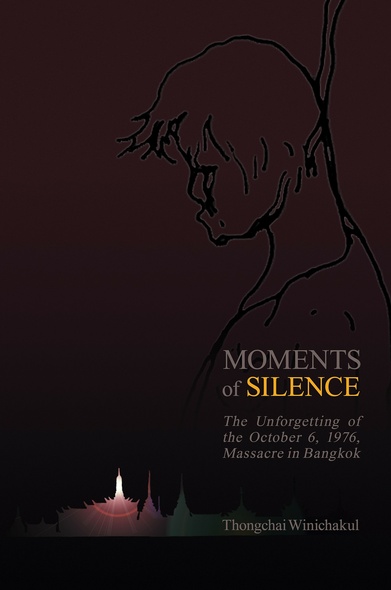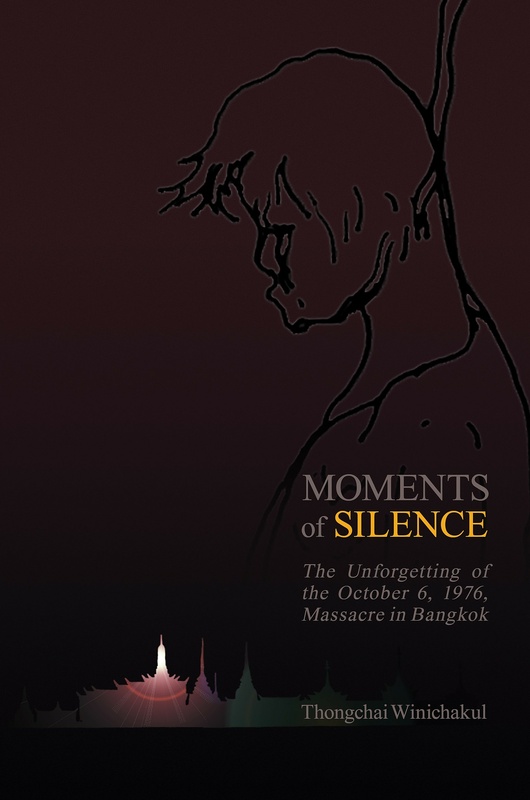
Moments of Silence
The Unforgetting of the October 6, 1976, Massacre in Bangkok
The massacre on October 6, 1976, in Bangkok was brutal and violent, its savagery unprecedented in modern Thai history. Four decades later there has been no investigation into the atrocity; information remains limited, the truth unknown. There has been no collective coming to terms with what happened or who is responsible. Thai society still refuses to confront this dark page in its history.
Moments of Silence focuses on the silence that surrounds the October 6 massacre. Silence, the book argues, is not forgetting. Rather it signals an inability to forget or remember—or to articulate a socially meaningful memory. It is the “unforgetting,” the liminal domain between remembering and forgetting. Historian Thongchai Winichakul, a participant in the events of that day, gives the silence both a voice and a history by highlighting the factors that contributed to the unforgetting amidst changing memories of the massacre over the decades that followed. They include shifting political conditions and context, the influence of Buddhism, the royal-nationalist narrative of history, the role played by the monarchy as moral authority and arbiter of justice, and a widespread perception that the truth might have devastating ramifications for Thai society. The unforgetting impacted both victims and perpetrators in different ways. It produced a collective false memory of an incident that never took place, but it also produced silence that is filled with hope and counter-history.
Moments of Silence tells the story of a tragedy in Thailand—its victims and survivors—and how Thai people coped when closure was unavailable in the wake of atrocity. But it also illuminates the unforgetting as a phenomenon common to other times and places where authoritarian governments flourish, where atrocities go unexamined, and where censorship (imposed or self-directed) limits public discourse. The tensions inherent in the author’s dual role offer a riveting story, as well as a rare and intriguing perspective. Most of all, this provocative book makes clear the need to provide a place for past wrongs in the public memory.
Awards
- 2022, Winner - EuroSEAS Humanities Book Prize
- 2023, Winner - AAS Southeast Asia Council (SEAC) George McT. Kahin Book Prize
After reading Moments of Silence, no one should ever again refuse scholars the right to fuse emotion with analysis in reflecting on tragic events they have witnessed. At once a riveting memoir, a careful scholarly assessment, a yearning for conversations never consummated, and an act of sustained political courage tempered with compassionate fairness, the book exposes the violence that the continuing silence about the events of 1976 has inflicted on the Thai body politic. That silence, the norms that sustain it, and the labile public memory those norms have shaped serve the unsmiling authoritarianism that still haunts the ‘land of smiles’ to this day.
Thongchai Winichakul has done it again. Siam Mapped remains one of the most impressive books on Thailand’s past ever written, and his new one is just as good. Moments of Silence is also bracingly personal, for its author as a young activist was directly affected by the violence that convulsed Bangkok in 1976. An innovative blend of memoir and theoretically informed ruminations on memory, Moments of Silence has much to offer not just those concerned with Southeast Asia but also anyone interested in the myriad other settings, from Beijing and Burma to Cairo and Kent State, that have been sites of massacres, large or small, with complex and contested legacies.
It is very difficult for anyone belonging to the 1970s generations of Southeast Asian student activists to read and finish Moments of Silence.There is so much pain in this memoir of Thongchai Winichakul. Yet, somehow, he has been able to take a step back and analyze the 1976 massacre of his fellow students at the Thammasat University. With this book, Thailand’s ruling elites will not be able to hide the full story of that tragedy anymore.
The subject of Thongchai Winichakul’s Moments of Silence is not so much what actually happened on 6 October, but the silence that followed. There has never been an official investigation, and a blanket amnesty issued two years after the event absolved all perpetrators from blame. Most school textbooks make no mention of it, and those that do gloss over it in just a few sentences. To this day, the event remains cloaked in mystery, poorly understood and often misremembered. Thongchai’s revelatory memoir-cum-history charts a chronological journey through this silence, examining its causes, exploring its impact on individuals and exposing the toll it has taken on the collective psyche. . . . If Thailand ever reconciles with or integrates this grim chapter into the national history and collective psyche, it will be because of brave books like Moments of Silence.
The silhouette at the top right of this achingly beautiful book cover recalls a famous photograph from the Thammasat massacre of Oct 6, 1976. The photo showed a dead man hung from a tree being beaten by a chair while a ring of people watch. The silhouette is deliberately ghostly. The incident is well-known but little known. . . . Thongchai argues that the incident is too cruel and too disruptive of the national narrative to be embraced as part of the history, either by the state or by many of its members. . . . This brilliant book arrives just as a new wave of student protesters has taken to the streets to oppose dictatorship, evidently aware of the parallels between their movement and the 1970s. For these brave men and women, this book can serve as both inspiration and warning.
The book is the most thorough study of 6 October. It draws on the Thai and English language literature, supplemented by the author’s own extensive interviews by many parties involved with the event. Yet, there are many still unanswered questions. . . . A new generation of university, and even high-school, students are learning about this event. The book’s publication is therefore extraordinarily timely. This is a fascinating and important book, as well as a testament to those who lost their lives on that day. It will throw new light on 6 October, but will also spark debate about the relationship between memory and history.
As Thongchai documents in his powerful and personal book Moments of Silence, more than 40 years later, much about the massacre remains unknown, from victims who are still unidentified to deeper and more dangerous questions about the exact role of the monarchy and the military. . . . [T]he monument to 6 October remains a significant marker of past state violence. This book, too, is a powerful study of how a violent past can haunt a society when left unaddressed.
Thongchai Winichakul is emeritus professor of history at the University of Wisconsin–Madison.




